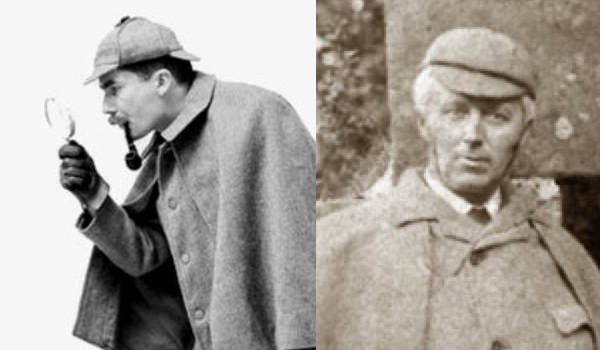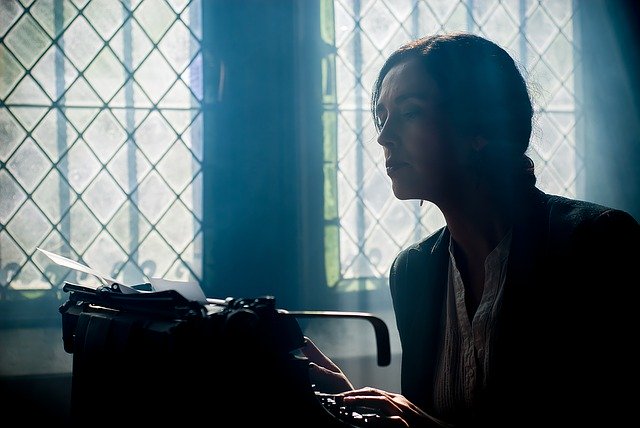Six Real-Life Authors Who Made Themselves Into Fictional Characters
Nicolas Cage as Charlie Kaufman in Adaptation
Note: In writing this, I realized that I appear on film with 2 of these writers, which is starting to make me wonder if I’m actually a fictional character myself. My girlfriend insists I’m real, but I’m still not entirely convinced, despite the fact that she poked me a lot and it really hurt.
It’s generally accepted that there’s a fine line between reality and fiction, but sometimes it gets particularly difficult to tell just where that line is — and these authors don’t help. We’re told not to confuse the artist and the art, that a first-person voice is not necessarily that of the author, that the views and opinions of the characters do not necessarily reflect those of the person that created the characters.
But then sometimes, the person who created the characters is a character, and then things just get all like super confusing and meta-heady-wackiness ensues and you’re not really sure where one thing starts and the other begins. And so without any further ado, I present to you 6 real-life authors who are also fictional (by their own pens, no less).

Jason Schwartzman as (fictional) Jonathan Ames
Jonathan Ames: Jonathan Ames the writer first appeared on the literary scene in 1989 in his debut novel I Pass Like Night, which recounts the narrator’s various sexual exploits in ways both shocking and hilarious. Some of these encounters are later recounted (albeit with some differences) in his debut graphic novel The Alcoholic, which explicitly features a protagonist named Jonathan A, who is also a novelist.
Later, Jonathan Ames (the writer) created a TV show called Bored To Death (based on his own short story of the same name) which focuses on the misadventures of a novelist-turned-amateur-detective named Jonathan Ames, whose debut novel is called I Pass Like Night (also you can totally see me in the Season 2 finale at the Brooklyn Comic-Con). As Ames himself has said in many interviews, “Whenever I wrote fiction, people always seemed to think that what I wrote was true, that it was entirely autobiographical. And when I would write non-fiction, they often accused me of exaggeration and fictionalization…so I decided to give it a try and thoroughly confuse my few readers.”
And I think he has succeeded at that.

Kurt Vonnegut: Much of Vonnegut’s work features, or at least alludes to, a fictional sci-fi writer named Kilgore Trout, who is generally believed to be a fictional image of Vonnegut himself. But then sometimes Vonnegut himself also ends up in his own stories — occasionally even accompanied by Kilgore Trout. He appears as a character in the novel Breakfast of Champions, observing and even interacting with several other fictional characters in the story.
But it’s Vonnegut’s final novel, TimeQuake, where things get trippy. As explained in the first chapter of the book, the original idea for the novel TimeQuake was that the universe began to momentarily shrink, but then changed its mind, forcing everyone to re-live the last 10 years (give or take) of their lives, precisely as they happened the first time. According to Vonnegut, he had some difficulty turning this into an actual interesting narrative, so the idea was scrapped, and the book that ultimately became TimeQuake was a combination of autobiographical anecdotes, and elements of what would have been his original intended story (with Vonnegut essentially telling readers what would have happened in the book he was trying to write).
However, Vonnegut still recounts the autobiographical parts of the book in terms of the timequake from the original plot — rather than simply recounting memories of the last ten years, he tells these personal stories in terms of having re-lived them on autopilot, thanks to the effects of the fictional timequake. And so, one presume that while the stories themselves are non-fictional, the timequake itself was a piece of fiction…or was it? (Image via Letters Of Note).

Charles Yu: As the youngest writer on this list, it is likely that Charles Yu drew at least some influence from his metafictional colleagues here, but he has still found a unique voice of his own. Or maybe I’m giving the real-life Charles Yu way too much credit here, and it’s actually the fictional Charles Yu that has established himself as a unique literary voice. Honestly, I have no idea.
His (real-life Charles Yu’s) debut novel How To Live Safely In A Science Fictional Universe tells the story of the Fictional Charles Yu, a time machine repairman who is caught in a timeloop when he gets shot by Future Fictional Charles Yu, who then hands Present Fictional Charles Yu a copy of a book called How To Live Safely In A Science Fictional Universe which is written by some version of Charles Yu (real or fictional, it’s never quite clear), and which Present Fictional Charles Yu must now write, because obviously some version of Charles Yu had to have to written the story at the some point in the future in order for Future Fictional Charles Yu to have even given the book to Present Fictional Charles Yu in the first place.
Woo. Okay. You got that? Good.
The book uses this time travel motif to explore Fictional Charles Yu’s childhood, and the family with which he grew up. But is there any actual resemblance between Fictional Charles Yu’s childhood, and Real-Life Charles Yu’s childhood? I suppose that depends on which one you ask.

Grant Morrison: Grant Morrison is a fictional character in several DC Comics. He is also the author of many highly renowned comic books, including those published by DC Comics which feature him as a character. Fictional Grant Morrison’s first appearance was in Animal Man #25 when, after sending the titular hero on a wild quest through Comic Book Purgatory, the two characters sit down together and discuss the nature of free will, amongst other things. After the gruesome murder of his family, Animal Man decided that he needed to find the person responsible — and of course, it was Grant Morrison himself who murdered Animal Man’s family, being the writer of the comic book in which they were killed.
And as if that’s not weird enough, Grant Morrison (the real one) also used himself as the basis for the character of King Mob in his epic conspiracy-magic-spy-thriller-brouhaha series The Invisibles. An avid chaos magician, Morrison created King Mob as a “fictionsuit” for himself — which was cool, until the lines between fiction and reality started to blur, and things that happened to King Mob in the comic book also started happening to Grant Morrison in real life, eventually causing Morrison to be hospitalized with a flesh-eating virus on his face (no but seriously that actually happened).
From that point on, he was very careful about the situations that he placed the character in, and was a bit more cautious with his magic, too. (Metafiction plays into a lot of Morrison’s work, including Final Crisis, which features an army of Supermans from every dimension battling an evil “self-assembling hyperstory” between the panels of a comic book. Mind=blown)
There’s also a shot of me in the Grant Morrison documentary Talking With Gods: The True Story of a Fictional Life, which was a surprise to me the first time I saw it, and made me wonder if that means that Grant Morrison just turned me into a fictional character, too.

Philip K. Dick: Most people know Philip Kindred Dick as The Guy Who Wrote The Book That Pretty Much Every Hollywood Sci-Fi Movie Is Vaguely Based On. His fiction often featured paranoid, transcendental, and occasionally schizophrenic ideas, reflecting his own fractured psyche. His later work in particular, including VALIS, was inspired by a series of bizarre hallucinations he experienced over two months in 1974.
VALIS tells the story of Horselover Fat, who experiences similar hallucinations. The book is narrated by Philip K. Dick, who almost immediately informs the reader that “Philip” is Greek for “fond of horses,” and “dick” is German for “fat,” so Horselover Fat is in fact just a fictional analog of Philip Dick. Except Philip Dick is also a character. Occasionally, Philip Dick and Horselover Fat interact with one another; occasionally, Philip Dick the character will talk with other characters about Horselover Fat. Eventually, a 2-year-old girl who may or may not be God incarnate (I can’t explain it, read the book) points out to Philip and Horselover that they are the same person, at which point they re-combine into a single identity until the very end of the book when they each go their separate ways.
Yeah.
Fictional Philip K. Dick also appears in the short story Orpheus With Clay Feet, in which a character travels back in time to inspire his favorite sci-fi author, Jack Dowland (Dick’s real-life pen name, at the time). This trip ultimately turns off Dowland from ever becoming the great sci-fi writer he was meant to be, and Dowland ends up publishing a single science fiction story — a short story called Orpheus With Clay Feet, published under the pen name Philip K. Dick. (Talk about recursive; do you think Dick kind of shot himself in the foot with that?)

Charlie Kaufman: In 1999, fresh off the hit Being John Malkovich (another metafictional tale), screenwriter Charlie Kaufman was hired to write an adaptation of The Orchid Thief, a non-fiction book about Seminole orchid poachers in south Florida. Struggling to find a strong narrative hook for a story about black market flowers, Kaufman did what all sane people would do: he wrote a screenplay about Charlie Kaufman struggling to write a screenplay adaptation of The Orchid Thief.
To everyone’s surprise, turning said script into the studio somehow did not result in career suicide, and Adaptation (as the film was eventually called) was even nominated for an Oscar for Best Adapted Screenplay (it was still technically an adaptation of The Orchid Thief) (kind of).
To make things even more interesting, Kaufman created a fictional twin brother himself in the movie named Donald Kaufman. Donald is a slacker who aspires to be a screenwriter like his brother Charlie, and his hackneyed psychological thriller script The 3 ends up selling for “six or seven figures.” This in turn inspires Charlie (in the movie) to recruit his brother’s assistance for his own screenplay. And so, the real-life screenplay of Adaptation is actually credited — officially, according to the WGA and everything — to Charlie Kaufman and Donald Kaufman, making Donald Kaufman the first entirely fictitious person to ever be nominated for an Academy Award. (Image via Joblo)
—
Thom Dunn is a writer, musician and comic book fan. Follow him on Twitter (@thomdunn) and visit his blog at thomdunn.net.



